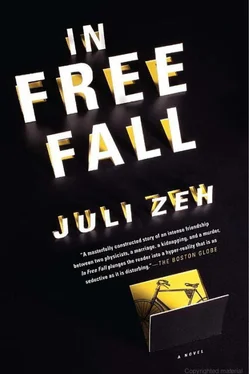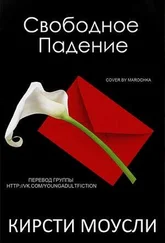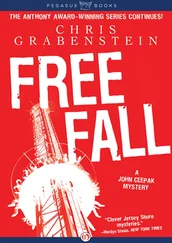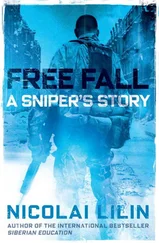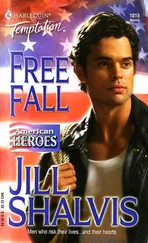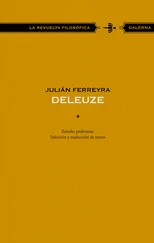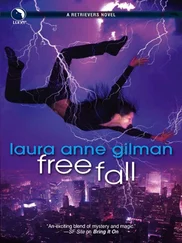The host calls for silence so that Sebastian can speak.
“The discussion here doesn’t seem to be about the intersection between physics and philosophy,” Sebastian says, “but about the intersection between physics and polemic.”
Laughter from the audience shows that they are on his side again.
“Much as barbed language can be fun—”
“By the way,” Oskar interrupts, placing a finger on his cheek as if something has just occurred to him, “according to your theory, it is not just the Creator who does not have to make any decisions. Nobody else does, either.”
“On the contrary,” Sebastian says. “One of the philosophical advantages of the Many-Worlds Interpretation is that it can explain the free will of mankind. In linear time—”
“Now it’s getting esoteric!” Oskar laughs.
The camera is too late to catch Oskar, reaching him only as he waves away the host’s admonishment. Schilf, who is watching the screen so intently that his eyes are burning, notices that Oskar’s left foot is twitching.
“In linear time,” Sebastian says, “our fates are determined from the earliest past into the most distant future. Our decisions are nothing more than biochemical processes in the brain that are subject to the laws of cause and effect.” He leaves a dramatic pause before continuing. “Now imagine that every conceivable causal sequence exists at the same time in parallel universes. The way every individual universe develops may be predetermined, but our freedom consists of being able to choose one of these many worlds with every decision.”
“Ladies and gentlemen, justification for the freedom of will through physics,” the host says exultantly. His glasses reflect the spotlights, and he looks incredibly happy, as if he can see his program director’s beaming face as he speaks.
“And that holds true, although science and determinism normally—”
“Then I would like to know,” Oskar interrupts, “why we can’t simply exercise an act of will to choose a universe in which the Second World War never happened. That would be nice.”
The blood has risen in Sebastian’s face. He slides forward and sits upright.
“That’s because we are subject to the principle of self-consistency,” he says. “And you know that only too well! Otherwise, according to the second law of thermodynamics, we could dissolve into a state of cumulative chaos.”
“And that’s exactly what we’re doing,” Oskar says. “Looking at you, one might conclude that this dissolution can sometimes happen all too quickly.”
He gives Sebastian a challenging look and taps his finger on his forehead.
“Excuse me,” the host says, “we can’t…”
The uproar in the studio drowns him out. Oskar makes an impatient gesture with his hand to wave away any further disturbance, and turns his perfect profile to the camera, looking past the host, straight at Sebastian. The twitch in his left foot has grown more violent. His relaxed manner suddenly seems a poor front. He looks like a man whose smooth facade conceals boundless rage.
“If every decision is accompanied by its opposite,” he says, “then it is no decision at all. Do you know what your justification for free will is? It’s a license to behave like a swine!”
“Please…” the host says.
“That’s…” Sebastian attempts.
“ One universe,” Oskar says. “With no possibility for escape. That’s what you should be researching. That’s where you should be living. And where you should take responsibility for your own decisions.”
“That’s not a scientific argument,” Sebastian says, barely managing to control himself. “That’s moralistic dogmatism!”
“And a good deal better than immorality legitimized by physics.”
“Not one word more!” Sebastian screams.
“In your double worlds,” Oskar says with feverish intensity, “you live a double life. And you pretend that you can do something and also not do it at the same time.”
There is a merciless close-up of Sebastian’s Adam’s apple rising and falling as he swallows heavily. The unrest in the audience has increased again. One man raises his fist, but it is not clear against whom or what.
“Let me put it in Orwell’s words,” Oskar says, standing up.
He has left the microphone on the glass table. He points his index finger at Sebastian and says something that cannot be heard in all the commotion. The host’s mouth is opening and shutting helplessly.
Oskar says something else that cannot be heard, and then the picture freezes.
The detective has grown warm. He has grabbed hold of the mouse to pause the clip, and is looking for a way to play the last few seconds again.
“That’s not allowed,” the librarian says.
Schilf gives a start, as though someone has stabbed him in the neck. A shadow falls over the workstation.
“You can’t download films here. The computers are here for research.”
This country is made up of prohibitions just like a house of cards is made of cards, the detective thinks. Perhaps I ought to have applied for something on the other side back then.
“This is a scientific program,” he says out loud. “I’m from the police.”
“And I’m enforcing the rules,” the librarian says. “Do you have a search warrant?”
Without waiting for his reply, she leans forward and closes every open window with a rapid tap of the keys. Schilf has to get up from his chair in order to create some distance between himself and the woman. Her eyelids are covered with a thick layer of purple eye-shadow.
“Can I help you in any other way?”
“No thank you,” the detective says. “I was just about to go.”
On the street, he stands under a lowering sky and does not know where to go next. Cars pass in both directions and people stride toward secret destinations. Pain drills into his lower jaw. Schilf puts both hands to his face to prevent it from falling apart. He has to keep watching the cars so that they will continue moving, has to lean against the wall so that it won’t collapse. He has to watch the passersby so that they won’t crumble into dust. He is a pillar of the sky, a generator of time, the perpendicular in the earth’s axis. If he closes his eyes the earth will no longer exist. Only the headache.
Not yet, not now, the detective thinks.
His next few steps land on firm ground, small paving stones that are exactly the same size as the soles of his shoes. He takes out his mobile phone and gets through to international directory assistance. He asks for a number in Geneva.
BIRD FLU HAS SCURRIED INTO EUROPE on its clawed feet. Migratory birds spread the virus to the farthest corners of the world. Seagulls are dropping dead from the sky near the coast of Hamburg and mankind is preparing for an epidemic. Everything that flies is being executed. Soon the last feather will float to earth in a forest clearing. After that, Detective Schilf will be carrying the last surviving bird’s egg in his head.
He puts down the crumpled newspaper that he found on his seat. Bird flu. As if there were no other problems. He has used up the doctor’s painkillers, and has managed to get only ibuprofen in the pharmacy at the station. Sitting opposite him is a mustached man in his mid-fifties, who is busy copying the train schedule into a notebook with a marker. The barren stomp and jangle of twenty-first-century music is forcing its way out of a girl’s headphones. Two rows down, a train conductor is rebuffing an angry woman’s accusations. Please let me finish what I am saying. The staff is doing its best. Everything that is possible happens.
Outside, the gray ceiling of sky stretches westward. A successful performance of late autumn in July.
Читать дальше
